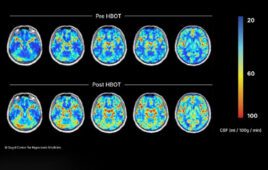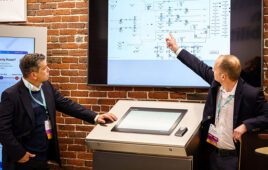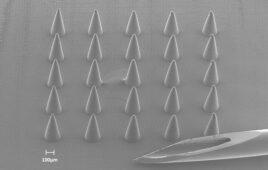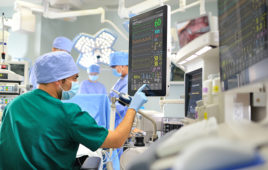The University of Wollongong’s Australian Institute for Innovative Materials (AIIM) will from November 23 run the four-week online course ‘Bioprinting: 3D Printing Body Parts’, through UOW’s partnership with global online learning platform FutureLearn.
The partnership with the social learning platform will put UOW’s research expertise alongside more than 60 global institutions and leading educators in offering a diverse range of free online courses.
UOW joins this prestigious group in the newly created Centres of Excellence member category, which focuses on research-based education.
The online course will be led by Professor Gordon Wallace, whose work is at the forefront of biomedical science, and will tell the story of the beginnings of 3D printing, how it is currently being used and what will be possible in years to come.
“We started this journey only a few short years ago by taking off-the-shelf office printers and having our engineers rebuild them to be able to print a bio-ink, embedded with human cells, that we had just developed,” Professor Wallace said.
“In the short time since, revolutionary scientific advances in 3D-printing technology and the development of amazing biomaterials, which can seamlessly integrate into the body, means we may be only a few years away from a time when every major hospital will contain 3D printing capabilities.
“This emerging field of biofabrication is being made possible through connections between medicine and technology and we are now seeing previously unimaginable developments, such as prosthetic limbs controlled by thought alone, and bionic implants to restore lost senses, and of course – 3D printing of human organs.”
Professor Wallace leads the UOW-headquartered Australian Research Council Centre of Excellence for Electromaterials Science (ACES), with equipment and technical support from the Australian National Fabrication Facility (ANFF).
Course material will be presented in language understood by a general audience and will use case studies to illustrate the impact that 3D printing already has on the ability to create customized medical devices.
These case studies include the 3D printing of personalized titanium hip implants using selective laser melting, the creation of made-to-fit masks for facial transplant recipients using hot melt extrusion, and the potential for lab-grown organs structured through the ink-jet printing of living cells.
The course is four weeks duration, requiring two hours of study per week. It is aimed at high school leaver considering studying the course at university or current undergraduates.
The 3D Bioprinting course provides a taste of what students will learn through undergraduate study at UOW in the disciplines of degrees in science, mechatronics and materials engineering, and later as part of the new Masters degree in Biofabrication.
UOW Deputy Vice-Chancellor Academic, Professor Eeva Leinonen, said: “The opportunity to share with a global learning community the impact our research has on everyday lives was an exciting extension of who we are at UOW”.
The UOW center of excellence that will follow with online courses via FutureLearn are the Centre for Archaeological Science (CAS), Early Start Research Institute (ESRI) and the Graduate School of Medicine (GSM).




